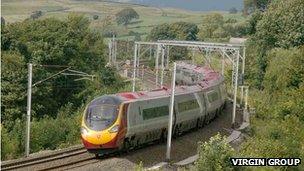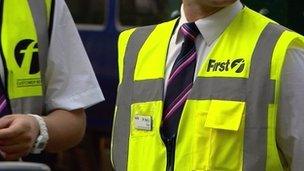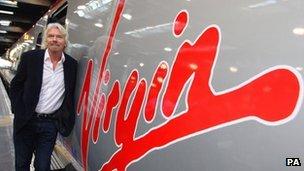What future for railways after West Coast reversal?
- Published
- comments

Virgin will be reimbursed for the cost of its bid for the West Coast train franchise
It sounded too good to be true, and perhaps we have now had confirmation it was.
First Group appeared to have won the West Coast Main Line franchise by offering the government much more than any firm had paid before for a service.
The deal would have seen the company pay back more than five times as much as Virgin paid for the previous deal.
It was an offer then that came in the middle of a recession to a government in need of every penny.
The fall-out from today now suggests it was as unrealistic as it was tempting.
Flawed assumptions
Now that deal has collapsed.
FirstGroup may challenge the decision but the government has now decided it was based on flawed assumptions about whether it was viable.
And so the West Coast Main Line could end up being run for a while by the state in the same way as its equivalent on the east coast.
In addition, the franchising process now looks so discredited that a reprivatisation of the East Coast Main Line early next year looks unlikely to happen.

FirstGroup could challenge the government's decision
So could this be the beginning of the end for rail privatisation?
Supporters of ending private ownership point to the contributions made to the public coffers by the publicly-owned East Coast.
Last year, it could pay the Treasury £187m and £170m the year before because it has no shareholders to reward.
It's possible then - as long as it is well-run - that a publicly-owned railway could actually deliver a better deal to the Treasury than a private franchise.
And Labour has now said it would keep East Coast in public hands as a comparator with the private franchises.
It also believes the West Coast should be run on the same basis.
Shadow transport secretary Maria Eagle said: "Passengers and staff deserve immediate reassurance about the future of the West Coast service.
"If the government now transfers the running of this line to its own not for private profit rail company, as seems sensible and likely, then Labour will support that decision.
"Ministers must also now abandon the planned privatisation of the East Coast line."
Policy 'minefield'
But Labour is still a long way short of committing to end privatisation.
It has not talked about unpicking any of the other franchise deals. Its transport policies are under review but would it really be prepared to enter that minefield?

Virgin Trains ran the West Coast Main Line for 15 years but lost the franchise to FirstGroup
The existing franchising system though looks like it might have reached the end of the line.
Labour itself had huge problems with it - accepting bids from GNER and National Express on the East Coast Main Line that looked lucrative but proved undeliverable.
FirstGroup is also handing back the Great Western franchise because it cannot meet the financial commitments.
Many passengers are also unhappy that fares seem to be on a perennial above inflation, upward trajectory.
Yet, of course, there is always the danger of looking at pre-privatisation British Rail through rose-coloured spectacles.
Few would argue life was perfect then.
Future franchises
But politicians may look more closely now at the state-run railways on the continent - some of whom actually run British franchises.
And for now at least the franchising contests have hit the buffers.
Three other competitions have been "paused".
Transport secretary Patrick McLoughlin said: "I want to make sure what lessons need to be learnt from what went wrong with this have not been repeated in those particular franchises."
The question is can the government reform the current system or is it irredeemable?
At the moment it's hard to predict the direction of travel for our privatised railways, and what the final destination will be.
I'd be interested to hear your thoughts and comments.